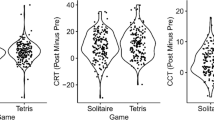Abstract
This study investigated how 3-D and 2-D computer game practice and delivery as well as individual differences affect performance on two tests of mental rotation (Vandenberg Mental Rotation Test and Card Rotation Test). Sixty-one US undergraduates from the Midwest completed 4 h of either massed or distributed practice. While computer game practice improved mental rotation scores in general, women’s gains were significantly greater than men’s, and the most significant gains were accomplished when practice was massed. High mathematical ability, gender, and type of practice significantly predicted improvement scores. The findings suggest that even very minimal computer game practice may improve performance on mental rotation tasks.



Similar content being viewed by others
References
Baenninger, M., & Newcombe, N. (1995). Environmental input to the development of sex-related differences in spatial and mathematical ability. Learning and Individual Differences, 7, 363–379.
Baenninger, M., & Newcombe, N. (1989). The role of experience in spatial test performance: A meta-analysis. Sex Roles, 20, 327–344.
Bjorklund, D. F., & Brown, R. D. (1998). Physical play and cognitive development: Integrating activity, cognition, and education. Child Development, 69, 604–606.
Casey, M. B. (2001). Spatial–mechanical reasoning skills versus mathematics self-confidence as mediators of gender differences on mathematics. Journal for Research in Mathematics Education, 32, 28–57.
Casey, M. B., Colon, D., & Goris, Y. (1992). Family handedness as a predictor of mental rotation ability among minority girls in a math–science training program. Brain and Cognition, 18, 88–96.
Casey, M. B., Nuttall, R. L., Pezaris, E., & Benbow, C. P. (1995). The influence of spatial ability on gender differences in mathematics college entrance test scores across diverse samples. Developmental Psychology, 31, 697–705.
Casey, M. B., Nuttall, R. L., & Pezaris, E. (1997). Mediators of gender differences in mathematics college entrance test scores: A comparison of spatial skills with internalized beliefs and anxieties. Developmental Psychology, 33(4), 669–680.
Ceci, S. J., & Williams, W. M. (2007). Are we moving closer and closer apart? Shared evidence leads to conflicting views. In S. J. Ceci, & W. M. Williams (Eds.), Why aren’t there more women in science: Top researchers debate the evidence (pp. 213–235). Washington, DC: American Psychological Association.
Cherney, I. D., & Neff, N. L. (2004). Role of strategies and prior exposure in mental rotation. Perceptual and Motor Skills, 98, 1269–1282.
Cherney, I. D., & Collaer, M. (2005). Sex differences in line judgment: Relation to mathematics preparation and strategy use. Perceptual and Motor Skills, 100, 615–627.
Cherney, I. D., & London, K. L. (2006). Gender-linked differences in the toys, television shows, computer games, and outdoor activities of 5-to 13-year-old children. Sex Roles, 54, 717–726.
Cherney, I. D., Jagarlamudi, K., Lawrence, E., & Shimabuku, N. (2003). Experiential factors on sex differences in mental rotation. Perceptual and Motor Skills, 96, 1062–1070.
Cherney, I. D., Rendell, J., & McDonough, R. (2006). The lines are drawn, but sex differences in spatial perception persist. Poster presented at the Association for Psychological Science Annual Convention, New York City, NY, May.
Cherney, I. D., Rendell, J., Brabec, C. M., & Runco, D. V. (in press). Mapping out spatial ability: Sex differences in way-finding navigation.
Cohen, J. (1988). Statistical power analysis for the behavioral sciences (2nd ed.). Hillsdale: Lawrence Erlbaum Associates.
Collaer, M. L., & Nelson, J. D. (2002). Large visuospatial sex difference in line judgment: Possible role of attentional factors. Brain and Cognition, 41, 1–12.
Collins, D., & Kimura, D. (1997). A large sex difference on a two-dimensional mental rotation task. Behavioral Neuroscience, 111, 845–849.
Derakshan, N., & Eysenck, M. W. (1998). Working memory capacity in high trait-anxious and repressor groups. Cognition and Emotion, 12, 697–713.
Donovan, J. J., & Radosevich, D. J. (1999). A meta-analytic review of the distribution of practice effect. The Journal of Applied Psychology, 84, 795–805.
Dorval, M., & Pepin, M. (1986). Effect of playing a video game on a measure of spatial visualization. Perceptual and Motor Skills, 62, 159–162.
Eccles, J. S., & Jacobs, J. E. (1986). Social forces shape math attitudes and performance. Signs, 11, 367–380.
Ekstrom, R., French, J., Harman, H., & Dermen, D. (1976). Kit of factor referenced cognitive tests. Princeton: Educational Testing Service.
Etaugh, C. (1983). The influence of environmental factors on sex differences in children’s play. In M. B. Liss (Ed.), Social and cognitive skills: Sex roles and children’s play. New York: Academic.
Eysenck, M. W., & Byrne, A. (1994). Implicit memory bias, explicit memory bias, and anxiety. Cognition and Emotion, 8, 415–431.
Feng, J., Spence, I., & Pratt, J. (2007). Playing an action video game reduces gender differences in spatial cognition. Psychological Science, 18(10), 850–855.
Halpern, D. F. (2000). Sex differences in cognitive abilities (3rd ed.). Hillsdale: Erlbaum.
Halpern, D. F., Benbow, C. P., Geary, D. C., Gur, R. C., Hyde, J. S., & Gernsbacher, M. A. (2007). The science of sex differences in science and mathematics. Psychological Science in the Public Interest, 8, 1–51.
Hopko, D. R., Ashcraft, M. H., Gute, J., Ruggiero, K. J., & Lewis, C. (1998). Mathematics anxiety and working memory: Support for the existence of a deficient inhibition mechanism. Journal of Anxiety Disorders, 12, 343–355.
Huttenlocher, J., Levine, S., & Vevea, J. (1998). Environmental input and cognitive growth: A study using time-period comparisons. Child Development, 69, 1012–1029.
Hyde, J. S. (2007). Women in science: Gender similarities in abilities and sociocultural forces. In S. J. Ceci, & W. M. Williams (Eds.), Why aren’t there more women in science: Top researchers debate the evidence (pp. 131–145). Washington, DC: American Psychological Association.
Janiszewski, C., Noel, H., & Sawyer, A. G. (2003). A meta-analysis of the spacing effect in verbal learning: Implications for research on advertising repetition and consumer memory. The Journal of Consumer Research, 30, 138–149.
Kenyon, J. (1984). Paper-and-pencil tests of Piaget’s water-level test: Sex differences and test modality. Perceptual and Motor Skills, 59, 739–742.
Kozhevnikov, M., Motes, M. A., Rasch, B., & Blajenkova, O. (2006). Perspective-taking vs. mental rotation transformations and how they predict spatial navigation performance. Applied Cognitive Psychology, 20, 397–417.
Law, D. J., Pellegrino, J. W., & Hunt, E. B. (1993). Comparing the tortoise and the hare: Gender differences and experience in dynamic spatial reasoning tasks. Psychological Science, 4, 35–40.
Liben, L. S., & Golbeck, S. L. (1980). Sex differences in performance on Piagetian spatial tasks: Difference in competence or performance? Child Development, 51, 594–597.
Liben, L. S., & Golbeck, S. L. (1986). Adults’ demonstration of underlying Euclidean concepts in relation to task context. Developmental Psychology, 22, 487–490.
Linn, M. C., & Petersen, A. C. (1985). Emergence and characterization of sex differences in spatial ability: A meta-analysis. Child Development, 56, 138–151.
MacLeod, C., & Donnellan, A. M. (1993). Individual differences in anxiety and the restriction of working memory capacity. Personality and Individual Differences, 15, 163–173.
McClurg, P. A., & Chaillé, C. (1987). Computer games: Environments for developing spatial cognition? Journal of Educational Computing Research, 3, 95–111.
Meyer, M., & Koehler, M. S. (1990). Internal influences on gender differences in mathematics. In E. Fennema, & G. C. Leder (Eds.), Mathematics and gender (pp. 60–95). New York: Teachers College Press.
Newcombe, N. S. (2007). Taking science seriously: Straight thinking about spatial sex differences. In S. J. Ceci, & W. M. Williams (Eds.), Why aren’t there more women in science: Top researchers debate the evidence (pp. 69–77). Washington, DC: American Psychological Association.
Newcombe, N. S., Mathason, L., & Terlecki, M. (2002). Maximization of spatial competence: More important than finding the cause of sex differences. In A. V. McGillicuddy-De Lisi, & R. De Lisi (Eds.), Biology, society, and behavior: The development of sex differences in cognition (pp. 183–206). Westport: Greenwood.
Okagaki, L., & Frensch, P. A. (1994). Effects of video game playing on measures of spatial performance: Gender effects in late adolescence. Journal of Applied Developmental Psychology, 15, 33–58.
Ozel, S., Larue, J., & Molinaro, C. (2004). Relation between sport and spatial imagery: Comparison of three groups of participants. The Journal of Psychology, 138, 49–63.
Parameswaran, G., & De Lisi, R. (1996). Improvements in horizontality performance as a function of type of training. Perceptual and Motor Skills, 82, 595–603.
Paulman, R. G., & Kennelly, K. J. (1984). Test anxiety and ineffective test taking: Different names, same construct? Journal of Educational Psychology, 76, 279–288.
Roberts, J., & Bell, M. (2000). Sex differences on a computerized mental rotation task disappear with computer familiarization. Perceptual and Motor Skills, 91, 1027–1034.
Sanders, B., Soares, M. P., & D’Aquila, J. M. (1982). The sex difference on one test of spatial visualization: A nontrivial difference. Child Development, 53, 1106–1110.
Schmidt, R., & Bjork, R. (1992). New conceptualization of practice: Common principles in three paradigms suggest new concepts for training. Psychological Science, 4, 207–217.
Sherman, J. A. (1982). Continuing in mathematics: A longitudinal study of the attitudes of high school girls. Psychology of Women Quarterly, 72, 132–140.
Spielberger, C. D., Gorsuch, R. L., & Luschene, R. (1970). The state-trait anxiety inventory (STAI) test manual form X. Palo Alto: Consulting Psychologists Press.
Subrahmanyam, K., & Greenfield, P. M. (1994). Effect of video game practice on spatial skills in girls and boys. Journal of Applied Developmental Psychology, 15, 13–32.
Terlecki, M. S., & Newcombe, N. S. (2005). How important is the digital divide? The relation of computer and videogame usage to gender differences in mental rotation ability. Sex Roles, 53, 433–441.
Terlecki, M. S., Newcombe, N. S., & Little, M. (2007). Durable and generalized effects of spatial experience on mental rotation: Gender differences in growth patterns. Applied cognitive psychology. Hoboken: Wiley InterScience.
Tohill, J. M., & Holyoak, K. J. (2000). The impact of anxiety on analogical reasoning. Thinking and Reasoning, 6, 27–40.
Vandenberg, S. G., & Kuse, A. R. (1978). Mental rotations: A group test of three-dimensional spatial visualization. Perceptual and Motor Skills, 47, 599–604.
Vasta, R., Knott, J. A., & Gaze, C. E. (1996). Can spatial training erase the gender differences on the water-level task? Psychology of Women Quarterly, 20, 549–567.
Voyer, D., & Sullivan, A. M. (2003). The relation between spatial and mathematical abilities: Potential factors underlying suppression. International Journal of Psychology, 38, 11–23.
Voyer, D., Voyer, S., & Bryden, M. P. (1995). Magnitude of sex differences in spatial abilities: A meta-analysis and consideration of critical variables. Psychological Bulletin, 117, 250–270.
Author information
Authors and Affiliations
Corresponding author
Additional information
This study was supported in part, by a Psi Chi summer fellowship to Tara Dickey. Preliminary results were presented at the 2004 Posters on the Hill conference sponsored by the Council on Undergraduate Research and the Great Plains Psychology Conference in Kansas City in 2004 and in Omaha in 2005. I would like to thank Tara Dickey, Judith Flichtbeil, Claire Seiwert, Holly Bourek, Nicholas Basalay, and Ann Kelly for their assistance with data collection.
Rights and permissions
About this article
Cite this article
Cherney, I.D. Mom, Let Me Play More Computer Games: They Improve My Mental Rotation Skills. Sex Roles 59, 776–786 (2008). https://doi.org/10.1007/s11199-008-9498-z
Received:
Accepted:
Published:
Issue Date:
DOI: https://doi.org/10.1007/s11199-008-9498-z




